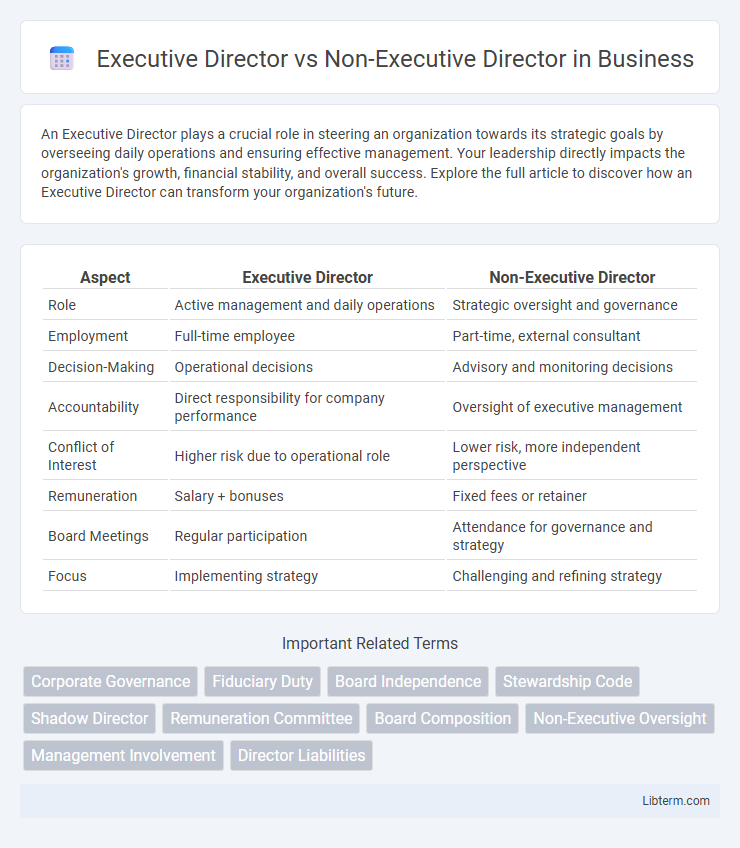An Executive Director plays a crucial role in steering an organization towards its strategic goals by overseeing daily operations and ensuring effective management. Your leadership directly impacts the organization's growth, financial stability, and overall success. Explore the full article to discover how an Executive Director can transform your organization's future.
Table of Comparison
| Aspect | Executive Director | Non-Executive Director |
|---|---|---|
| Role | Active management and daily operations | Strategic oversight and governance |
| Employment | Full-time employee | Part-time, external consultant |
| Decision-Making | Operational decisions | Advisory and monitoring decisions |
| Accountability | Direct responsibility for company performance | Oversight of executive management |
| Conflict of Interest | Higher risk due to operational role | Lower risk, more independent perspective |
| Remuneration | Salary + bonuses | Fixed fees or retainer |
| Board Meetings | Regular participation | Attendance for governance and strategy |
| Focus | Implementing strategy | Challenging and refining strategy |
Introduction: Understanding Executive and Non-Executive Directors
Executive Directors actively manage a company's daily operations and hold decision-making authority, often combining leadership roles with board responsibilities. Non-Executive Directors primarily provide independent oversight, strategic guidance, and ensure accountability without engaging in everyday management. Distinguishing these roles clarifies governance structures and enhances corporate performance.
Definition: Who Is an Executive Director?
An Executive Director is a senior member of a company's management team who is actively involved in daily operations, decision-making, and implementing company policies. This role typically combines board responsibilities with executive functions, ensuring strategic objectives align with operational execution. Unlike Non-Executive Directors, Executive Directors have a full-time commitment and hold a formal employment contract with the organization.
Definition: Who Is a Non-Executive Director?
A Non-Executive Director (NED) is a member of a company's board of directors who does not engage in day-to-day management but provides independent oversight and strategic guidance. Unlike an Executive Director, who has operational responsibilities, a Non-Executive Director ensures corporate governance, monitors executive performance, and protects shareholders' interests. Non-Executive Directors often bring external expertise and unbiased judgment to support long-term business sustainability and compliance.
Key Responsibilities of Executive Directors
Executive Directors hold primary responsibility for managing day-to-day operations, implementing company strategy, and making executive decisions to drive business performance. They oversee departments, allocate resources, and ensure compliance with corporate policies, directly influencing organizational outcomes. Unlike Non-Executive Directors who provide oversight and strategic advice, Executive Directors are actively involved in operational management and leadership.
Key Responsibilities of Non-Executive Directors
Non-Executive Directors primarily provide independent oversight and strategic guidance without engaging in daily management operations. Their key responsibilities include monitoring executive performance, ensuring compliance with corporate governance standards, and safeguarding stakeholders' interests by contributing to risk management and audit processes. They play a crucial role in offering objective input on company strategy and holding Executive Directors accountable.
Authority and Decision-Making Power
Executive Directors possess authority to make operational and strategic decisions within the company, holding direct management responsibilities and accountability. Non-Executive Directors provide oversight and governance, offering independent judgment without involvement in daily operations or direct decision-making authority. The contrast lies in Executive Directors' active role in executing company policies versus Non-Executive Directors' focus on monitoring performance and ensuring compliance with regulatory frameworks.
Involvement in Day-to-Day Operations
Executive Directors are actively involved in the day-to-day operations of a company, managing internal affairs and implementing strategic decisions. Non-Executive Directors primarily provide oversight, guidance, and independent judgment without engaging in daily management tasks. Their role centers on governance, risk assessment, and ensuring compliance with regulatory standards.
Impact on Corporate Governance
Executive Directors actively participate in the day-to-day management and decision-making processes, providing hands-on leadership that directly influences corporate strategy and operational effectiveness. Non-Executive Directors contribute independent oversight and unbiased judgment, enhancing accountability, risk management, and ethical standards by challenging executive decisions without involvement in daily operations. The balance between Executive and Non-Executive Directors is crucial for robust corporate governance, ensuring both strategic execution and rigorous control mechanisms.
Differences in Compensation and Benefits
Executive Directors typically receive higher compensation packages due to their full-time operational responsibilities, often including salaries, performance bonuses, and stock options, reflecting their direct impact on company performance. Non-Executive Directors generally earn fixed fees or retainers with limited or no bonus incentives, as their role centers on oversight and strategic guidance without daily management duties. Benefits for Executive Directors often encompass comprehensive health plans and retirement contributions, while Non-Executive Directors receive fewer or more modest benefits aligned with their part-time governance roles.
Choosing the Right Director for Your Board
Selecting the right director for your board involves understanding the distinct roles of Executive Directors, who manage daily operations and implement company strategy, versus Non-Executive Directors, who provide independent oversight and strategic guidance without direct management responsibilities. Executive Directors offer deep operational insight and hands-on leadership, while Non-Executive Directors bring external perspectives and ensure accountability, enhancing governance quality. Balancing these roles on your board strengthens decision-making, risk management, and long-term corporate success.
Executive Director Infographic

 libterm.com
libterm.com